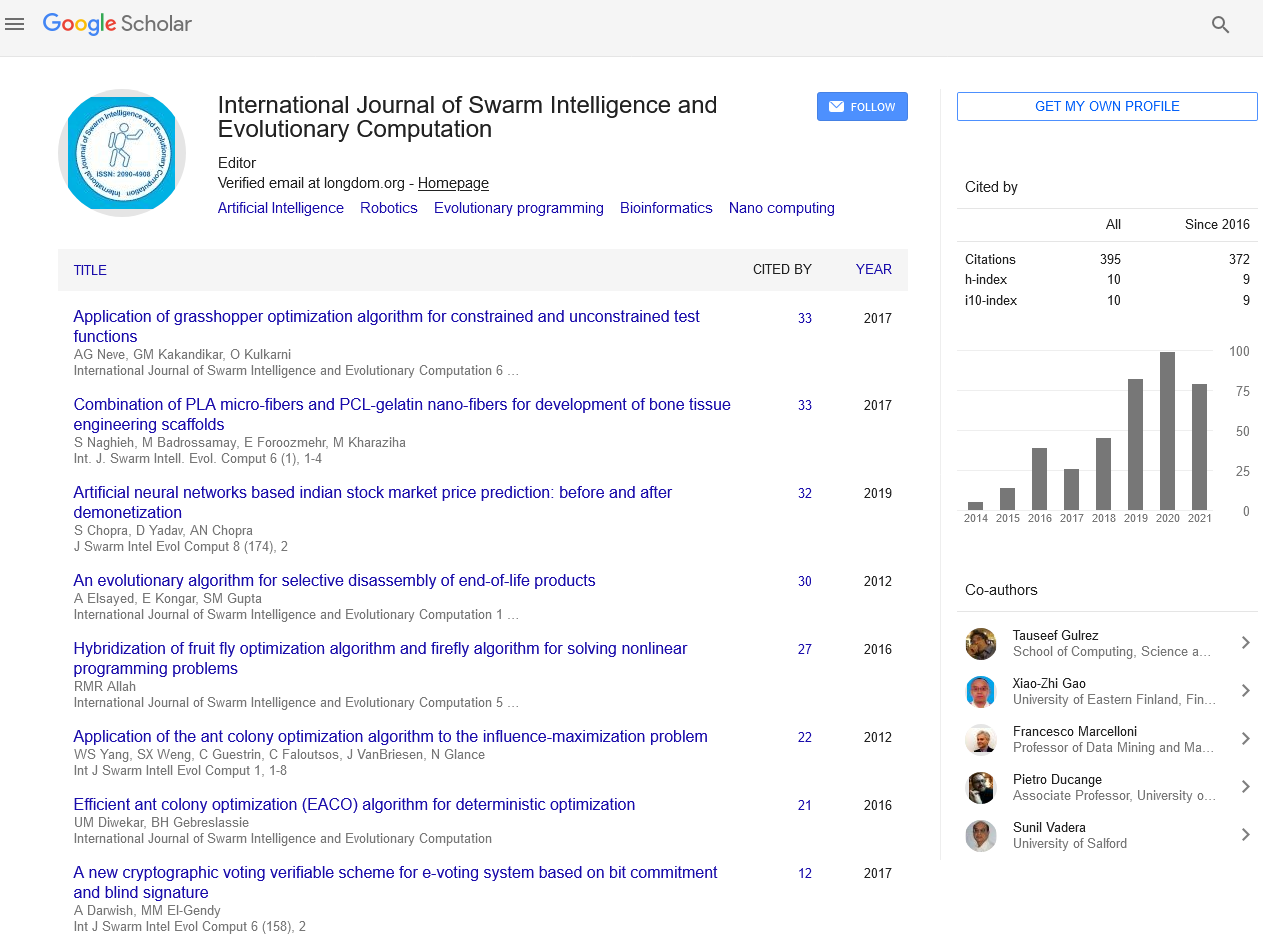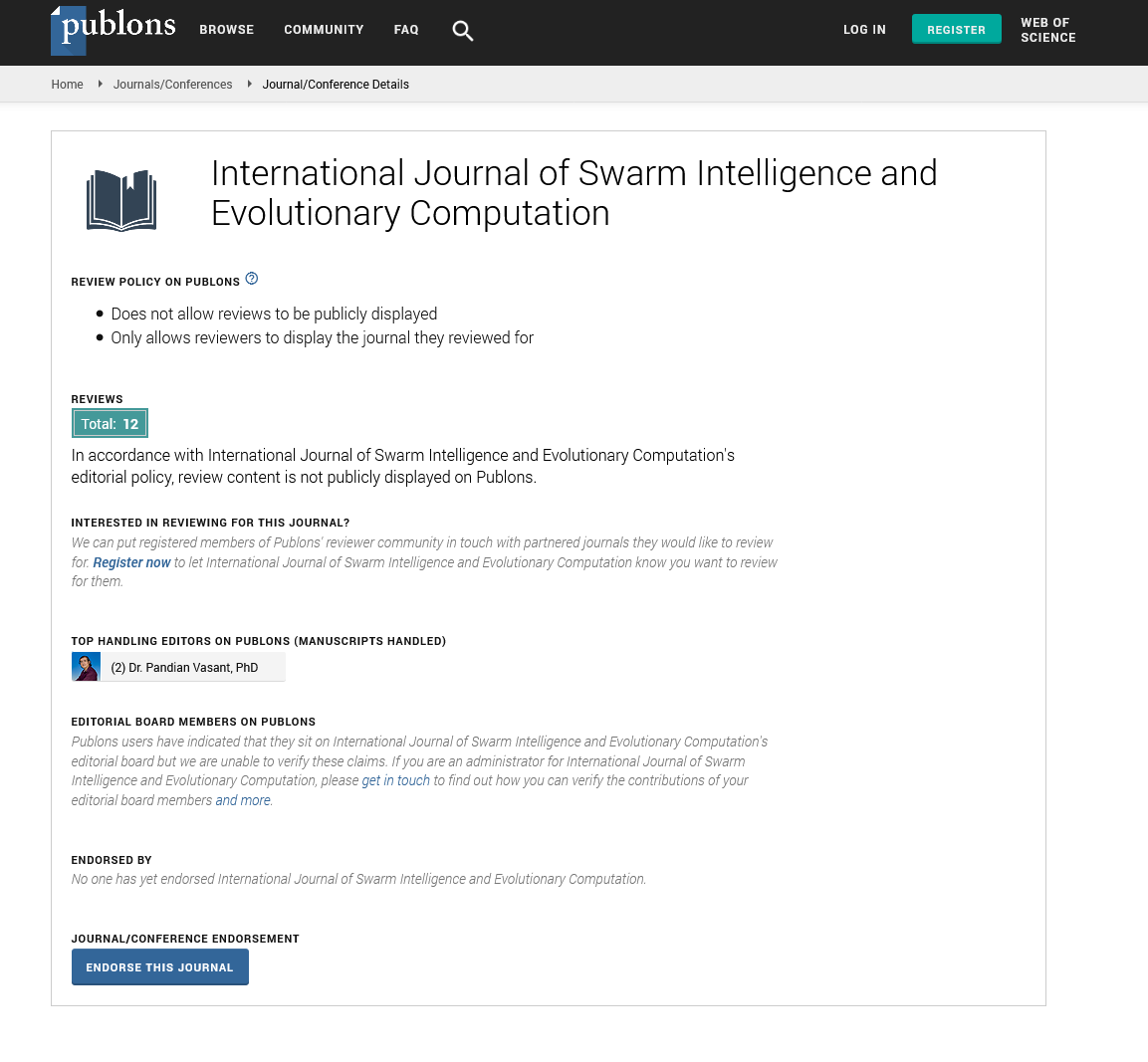Indexed In
- Genamics JournalSeek
- RefSeek
- Hamdard University
- EBSCO A-Z
- OCLC- WorldCat
- Publons
- Euro Pub
- Google Scholar
Useful Links
Share This Page
Journal Flyer

Open Access Journals
- Agri and Aquaculture
- Biochemistry
- Bioinformatics & Systems Biology
- Business & Management
- Chemistry
- Clinical Sciences
- Engineering
- Food & Nutrition
- General Science
- Genetics & Molecular Biology
- Immunology & Microbiology
- Medical Sciences
- Neuroscience & Psychology
- Nursing & Health Care
- Pharmaceutical Sciences
Perspective - (2023) Volume 12, Issue 4
The Fuzzy Frontier: Exploring the Versatility and Challenges of Fuzzy Logic
Ping Weing*Received: 05-Jul-2023, Manuscript No. SIEC-23-22650; Editor assigned: 07-Jul-2023, Pre QC No. SIEC-23-22650 (PQ); Reviewed: 21-Jul-2023, QC No. SIEC-23-22650; Revised: 28-Jul-2023, Manuscript No. SIEC-23-22650 (R); Published: 07-Aug-2023, DOI: 10.35248/2090-4908.23.12.324
Description
Fuzzy logic is a mathematical approach that extends classical logic to handle the concept of partial truth. Traditional Boolean logic operates with binary values, treating everything as either true or false. In contrast, fuzzy logic allows for degrees of truth, which are represented by values between 0 and 1. This makes it a powerful tool for modeling and managing uncertainty, ambiguity, and vagueness in various domains.
Fuzzy sets and membership functions
Central to fuzzy logic are fuzzy sets, which generalize classical sets by allowing elements to have degrees of membership. In a fuzzy set, each element is assigned a membership value between 0 and 1, indicating its degree of belonging to the set. The function that maps each element to its membership value is called the membership function.
Fuzzy logic operations
Fuzzy logic operations are similar to classical logic operations but are modified to work with degrees of truth. The three primary operations in fuzzy logic are:
Fuzzy intersection: The degree of membership in the result of an intersection is the minimum of the membership degrees of the elements in the original sets.
Fuzzy union: The degree of membership in the result of a union is the maximum of the membership degrees of the elements in the original sets.
Fuzzy complement: The degree of membership in the result of a complement is 1 minus the membership degree of the element in the original set.
Fuzzy inference systems
Fuzzy Inference Systems (FIS) are rule-based systems that use fuzzy logic to make decisions. A typical FIS consists of three main components includes:
Fuzzification: The process of transforming crisp inputs into fuzzy values using membership functions.
Inference: The application of fuzzy rules to the fuzzy inputs to produce fuzzy outputs.
Defuzzification: The process of converting the fuzzy outputs back into crisp values.
Applications of fuzzy logic
Fuzzy logic has been successfully applied in various fields due to its ability to handle uncertainty and imprecision. Some common applications include:
Control systems: Fuzzy logic is widely used in control systems for appliances, industrial processes, and vehicles. For example, a fuzzy logic-based washing machine can consider factors like load size, dirt level, and fabric type to optimize the washing cycle.
Decision support systems: Fuzzy logic is used in decision support systems to model and analyse complex decision-making processes. For instance, a medical diagnosis system may use fuzzy logic to consider multiple symptoms and their degrees of severity to suggest a diagnosis.
Pattern recognition: Fuzzy logic can be applied in pattern recognition tasks, such as image processing and speech recognition, where it helps deal with ambiguities and uncertainties in the input data.
Natural language processing: Fuzzy logic is used in natural language processing to handle the vagueness and ambiguity inherent in human language.
Conclusion
Fuzzy logic is a powerful mathematical tool for dealing with uncertainty, ambiguity, and vagueness. Its ability to handle degrees of truth makes it a valuable approach for modeling and managing complex systems in various domains. The integration of fuzzy logic with other AI techniques, such as neural networks and evolutionary algorithms, is an emerging trend. Hybrid systems that combine the strengths of multiple approaches can offer more robust and accurate solutions. As fuzzy logic continues to evolve and integrate with other AI techniques, we can expect even more innovative applications and solutions in the future. However, as with any technology, the responsible and ethical use of fuzzy logic remains crucial.
Citation: Weing P (2023) The Fuzzy Frontier: Exploring the Versatility and Challenges of Fuzzy Logic. Int J Swarm Evol Comput. 12:324.
Copyright: © 2023 Weing P. This is an open-access article distributed under the terms of the Creative Commons Attribution License, which permits unrestricted use, distribution, and reproduction in any medium, provided the original author and source are credited.


